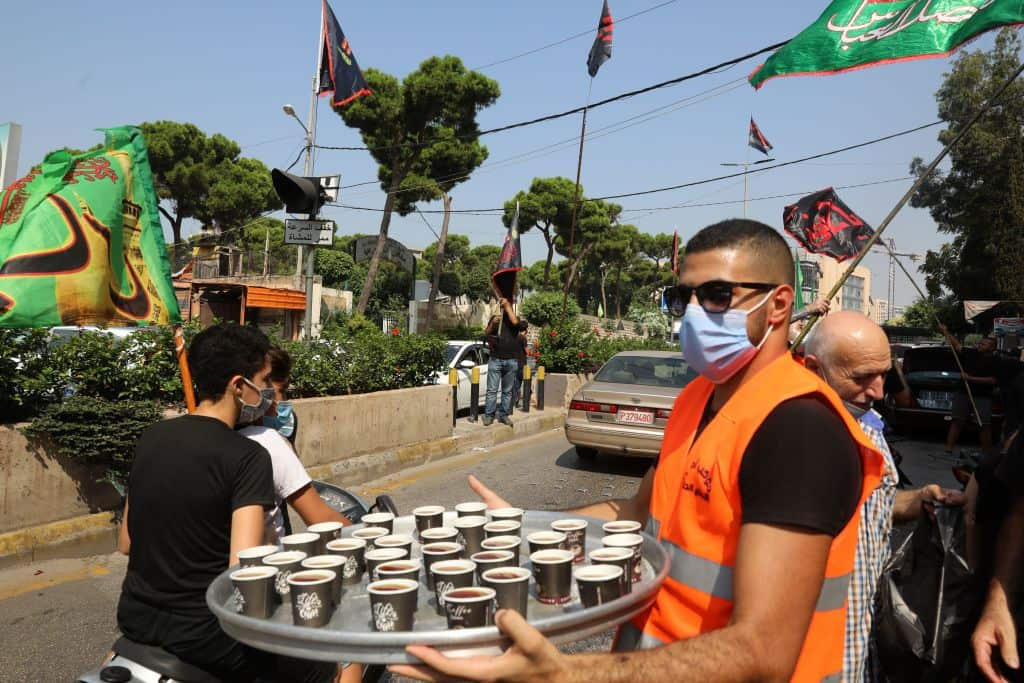Thousands of tearful Shiite pilgrims wearing gloves and masks have flooded Iraq's holy city of Karbala to mark Ashura, in one of the largest Muslim gatherings since the COVID-19 pandemic began.
Ashura, on the 10th day of the mourning month of Muharram, commemorates the killing of the Prophet Mohammed's grandson Hussein at the Battle of Karbala in 680 AD - the defining moment of Islam's confessional schism.
Typically, millions of Shiites from around the world flock to the golden-domed shrine where Hussein's remains are buried, to pray and cry, shoulder-to-shoulder.
But with coronavirus numbers spiking across the globe, this year's commemoration is subdued.
"Honestly, this year is nothing like the millions-strong commemorations of other years," said Fadel Hakim, who was out early on Sunday in the streets around the shrine, a blue medical mask cupping his chin.
"It stands out because there are so few people."
Small clusters of pilgrims gathered in the vast courtyards outside the main mosque, wearing the customary black mourning clothes along with less traditional masks and gloves.

Wading through the crowds were teams of shrine employees spraying disinfectant mist through long, thin hoses or distributing masks to any bare-faced visitor.
To be allowed into the shrine, people had their temperatures taken at grey gates resembling metal detectors.
Inside, signs on the carpet floor indicated the required distance between worshippers as they pray.
Nylon sheets prevented people from kissing the walls, a traditional sign of reverence.
Praying alone
But in the enclave where Imam Hussein is buried, pilgrims pressed their unmasked faces up against the ornate grille separating them from the mausoleum.
Many visitors were crying or sniffling, wiping their faces with bare hands - actions that could help the virus spread.
In the afternoon, they will gather for a dramatic re-enactment of Hussein's death at the hands of Caliph Yazid's forces.
It will include the famed "Tuwairij run", where processions of worshippers will sprint towards the shrine.
Last year, a stampede broke out that left at least 31 people dead and more than 100 more wounded.
The run is expected to be much smaller this year, as authorities in Iraq, other Shiite-majority countries and the United Nations urged people to mark the holiday at home.
Neighbouring Iran, which usually sends tens of thousands of pilgrims to Karbala, is the hardest-hit Middle Eastern country with over 21,000 coronavirus deaths.
Even Iran's supreme leader, Ayatollah Ali Khamenei, prayed alone, according to images published by his office, showing him wearing a mask in the vast, empty mosque at his residence.
In Afghanistan and Pakistan, health authorities have reported a fall in new virus cases but security remained a top concern, as Ashura has often been tainted by mass violence targeting Shiites.
Many have opted for scaled-down family gatherings, but some processions leading up to Ashura saw thousands turn out, and larger crowds are expected on Sunday.
"It's not possible that anyone would be infected with the virus," said Israr Hussain Shah, a Shiite devotee in the Pakistani capital Islamabad.
"Rather people come to heal and protect themselves, whether that's a virus of faith or a sickness," he said.
'An inferno'
In crisis-hit Lebanon, which has seen a severe coronavirus spike this month, powerful Shiite movements Hezbollah and Amal scrapped large Ashura processions.
They asked the faithful to follow sermons online and through Hezbollah-linked media channels.
Iraq has the second-highest regional toll with close to 7,000 deaths.
Last week, the World Health Organization warned that Covid-19 cases in Iraq were rising at an "alarming rate" and said Iraq should take action to end the community outbreak "at all costs".
"Mass assemblies of people should not take place at this stage," the WHO said.
All of Iraq's provinces had seen a steady spike in cases, with Karbala logging a record-high 336 cases on 21 August, the day that Muharram began.
The province had been closed to non-residents for months but two days before Ashura, authorities lifted restrictions to allow fellow Iraqis to enter.
Still, some opted for a quiet ceremony at home, including Abu Ali, in the packed Baghdad district of Sadr City.
"My children, grandchildren and I go to Karbala every year, but this year we were afraid of corona," he said.
"Imam Hussein wouldn't want us to throw ourselves into an inferno."
People in Australia must stay at least 1.5 metres away from others. Check your state’s restrictions on gathering limits. If you are experiencing cold or flu symptoms, stay home and arrange a test by calling your doctor or contact the Coronavirus Health Information Hotline on 1800 020 080.
News and information is available in 63 languages at https://sbs.com.au/coronavirus

